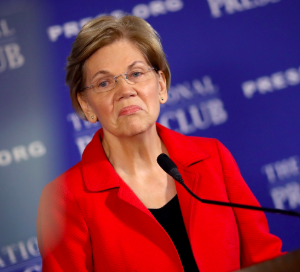If Sen. Elizabeth Warren loses New Hampshire — and with it, any chance of being the Democrats’ 2020 nominee — the post-mortem of her presidential hopes may lead back to a single endorsement by a local Granite State pol.
On Monday, New Hampshire State Sen. Martha Fuller Clark endorsed Joe Biden. “I’ve known Joe Biden for 30 years. I trust him. I admire him. I think he’s really an exceptional individual with great integrity,” she said.
Fuller Clark is a pillar of the Granite State’s progressive wing, the state’s only superdelegate in 2016 who was willing to side with Bernie Sanders against the state party’s pro-Hillary Clinton organization after he easily won the state’s primary.
While her decision to back Biden rather than Bernie is no doubt disappointing to the Vermont senator, it’s devastating to Warren. Not because a single legislator’s endorsement matters but because of what it Fuller Clark represents: a progressive, politically-active, well-educated woman over 40 from the suburbs. And she’s not alone: Last year former NH Congresswoman Carol Shea-Porter, considered the most liberal member of Congress ever elected from New Hampshire, also surprised some of her far-Left allies by embracing Joe Biden for president.
If the Warren campaign can’t keep these voters from going to Joe Biden (much less Bernie Sanders), how does she craft a winning coalition in the Democratic primary?
Fuller Clark acknowledged Warren’s dilemma. “New Hampshire is going to be tough for Warren, not because voters here don’t respect her and her values,” she told InsideSources. “It’s because she’s been overly ambitious. It has nothing to do with being a woman or the fact that she’s a progressive. It’s just a recognition that if we’re going to pull this country together, we’re going to have to be more [ideologically] inclusive.”
Meanwhile, Warren is struggling for endorsements, from progressives or moderates. Despite trailing Warren by a 5-1 margin in the polls, Sen. Cory Booker has as many endorsements from members of Congress as she does. And only one member of the infamous “Squad” — the young, outspoken progressives in Congress — has endorsed Warren: Her fellow Bay Stater Rep. Ayanna Pressley.
How is Booker, who can’t break three percent in Granite State polls, still getting endorsements from local liberal officeholders ahead of Warren?
Warren’s path to the nomination is easy to see: Combine progressives worried about Sanders’ chances against Trump with women still angry over Hillary Clinton’s defeat and the angry, anti-Trump Democratic base, and Warren looks like a lock. On paper.
Instead, the new poll from Monmouth College puts her in fourth place in New Hampshire, trailing Buttigieg, Biden and Sanders.
And as for owning the progressive vote, In the CBS/YouGov poll released last weekend, it’s Bernie Sanders dominating among self-identified liberals with 31 percent of their vote. Meanwhile, Warren narrowly edges past Biden with the far-Left 22 to 20 percent.
Warren supporters point out that she’s still within striking distance of the lead in Iowa and New Hampshire, and she’s got nearly twice Buttigieg’s level of support in national polling. But her trends aren’t good. Since Monmouth’s last New Hampshire poll in September, Buttigieg’s support has doubled –from 10 to 20 percent — while Warren’s has fallen by more than 40 percent, from 27 to 15 percent.
And then there are the endorsements Warren hasn’t gotten. Sen. Kamala Harris, a fellow progressive woman, has yet to endorse in the 2020 primary. The same with Beto O’Rourke, whose white, affluent, college-educated supporters closely mirror Warren’s base. He, too, is still on the sidelines. What’s keeping them from following Julian Castro’s lead and lining up with Warren?
In a multi-way primary with billionaires buying their way into 5 percent in the polls, all Warren needs to do is rally her natural base of support and hold those voters through the first four states. Instead, she’s losing natural allies in New Hampshire to the least-progressive Democrat in the field.
If Warren can’t find a way to get educated, affluent progressive women on board, where does she go from here?

